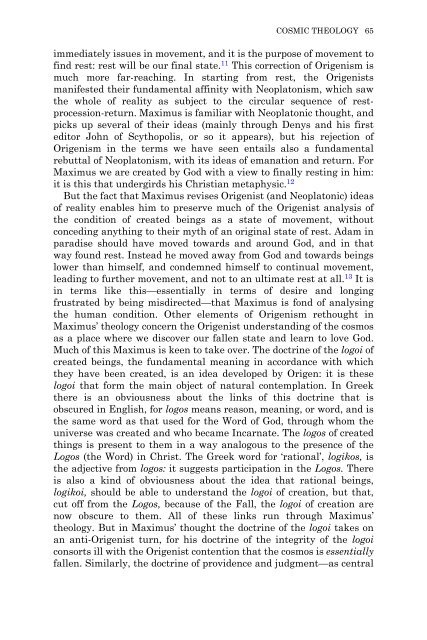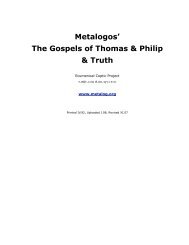Andrew Louth - Syriac Christian Church
Andrew Louth - Syriac Christian Church
Andrew Louth - Syriac Christian Church
You also want an ePaper? Increase the reach of your titles
YUMPU automatically turns print PDFs into web optimized ePapers that Google loves.
COSMIC THEOLOGY 65<br />
immediately issues in movement, and it is the purpose of movement to<br />
find rest: rest will be our final state. 11 This correction of Origenism is<br />
much more far-reaching. In starting from rest, the Origenists<br />
manifested their fundamental affinity with Neoplatonism, which saw<br />
the whole of reality as subject to the circular sequence of restprocession-return.<br />
Maximus is familiar with Neoplatonic thought, and<br />
picks up several of their ideas (mainly through Denys and his first<br />
editor John of Scythopolis, or so it appears), but his rejection of<br />
Origenism in the terms we have seen entails also a fundamental<br />
rebuttal of Neoplatonism, with its ideas of emanation and return. For<br />
Maximus we are created by God with a view to finally resting in him:<br />
it is this that undergirds his <strong>Christian</strong> metaphysic. 12<br />
But the fact that Maximus revises Origenist (and Neoplatonic) ideas<br />
of reality enables him to preserve much of the Origenist analysis of<br />
the condition of created beings as a state of movement, without<br />
conceding anything to their myth of an original state of rest. Adam in<br />
paradise should have moved towards and around God, and in that<br />
way found rest. Instead he moved away from God and towards beings<br />
lower than himself, and condemned himself to continual movement,<br />
leading to further movement, and not to an ultimate rest at all. 13 It is<br />
in terms like this—essentially in terms of desire and longing<br />
frustrated by being misdirected—that Maximus is fond of analysing<br />
the human condition. Other elements of Origenism rethought in<br />
Maximus’ theology concern the Origenist understanding of the cosmos<br />
as a place where we discover our fallen state and learn to love God.<br />
Much of this Maximus is keen to take over. The doctrine of the logoi of<br />
created beings, the fundamental meaning in accordance with which<br />
they have been created, is an idea developed by Origen: it is these<br />
logoi that form the main object of natural contemplation. In Greek<br />
there is an obviousness about the links of this doctrine that is<br />
obscured in English, for logos means reason, meaning, or word, and is<br />
the same word as that used for the Word of God, through whom the<br />
universe was created and who became Incarnate. The logos of created<br />
things is present to them in a way analogous to the presence of the<br />
Logos (the Word) in Christ. The Greek word for ‘rational’, logikos, is<br />
the adjective from logos: it suggests participation in the Logos. There<br />
is also a kind of obviousness about the idea that rational beings,<br />
logikoi, should be able to understand the logoi of creation, but that,<br />
cut off from the Logos, because of the Fall, the logoi of creation are<br />
now obscure to them. All of these links run through Maximus’<br />
theology. But in Maximus’ thought the doctrine of the logoi takes on<br />
an anti-Origenist turn, for his doctrine of the integrity of the logoi<br />
consorts ill with the Origenist contention that the cosmos is essentially<br />
fallen. Similarly, the doctrine of providence and judgment—as central




